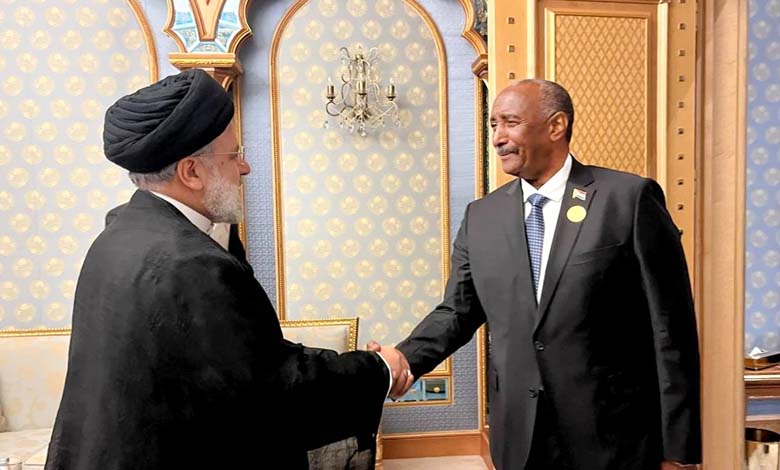Sudanese rapprochement with Iran and Turkey: Economic gains or geopolitical threats?

In a world where interests are intertwined and agendas clash, Sudan emerges as one of the key regional players seeking to reshape its alliances in the face of growing internal and external challenges.
-
Iran and Sudan: Mysterious Ambitions and Investments in Crises
-
Iranian-Sudanese Cooperation: Development Projects or a Disguise to Fuel Conflict and Strengthen Regional Influence?
In recent years, relations between Khartoum, on one hand, and Iran and Turkey, on the other, have undergone significant shifts, raising questions about the implications of this rapprochement on regional stability. While Sudan seeks to achieve economic and political gains, concerns surface that this turn of events might become a gateway for strengthening the influence of regional powers in a region already plagued by sectarian and political tensions. Does this rapprochement represent an opportunity to strengthen stability, or does it threaten to exacerbate divisions and deepen dependency?
Iran: Between regional influence and sectarian concerns
Iran, a regional power seeking to expand its influence in the Middle East, has found in Sudan a potential partner for its ambitious foreign policy.
-
Reasons Behind the Sudan-Iran Rapprochement and the Connection to the Muslim Brotherhood
-
Military Cooperation between Sudan and Iran: New Details Revealing the Complexity of the Strategic Alliance
Since the resumption of diplomatic relations between Tehran and Khartoum, bilateral relations have developed notably, marked by the signing of economic and security agreements.
These moves reflect Iran’s desire to strengthen its presence in the Horn of Africa, considered a strategic gateway to the Red Sea and the Indian Ocean. However, this rapprochement is not without risks. Iran, known for supporting armed militias in countries such as Yemen, Syria, and Lebanon, may use its relations with Sudan to further its regional agenda.
This raises concerns among some Arab countries, especially those that view Iranian influence as a threat to Arab national security. Additionally, the rapprochement with Tehran could fuel sectarian tensions in Sudan, which has a diverse and intricate demographic composition.
-
Implications and Dimensions of Iranian Support in Sudan
-
Iranian-Sudanese Cooperation and Its Impact on the Country’s Stability
Turkey: Soft power and economic investments
On the other hand, Turkey emerges as another partner for Sudan, as Ankara seeks to bolster its influence in the Arab world through both soft and hard power tools.
Under President Recep Tayyip Erdoğan, Turkey has secured a foothold in Sudan through substantial economic investments and military agreements.
Among these agreements, Turkey’s lease of the Sudanese port of Suakin, a strategic point on the Red Sea, stands out. However, Sudan-Turkey cooperation is not without challenges. Observers have expressed concern that this rapprochement could create an imbalanced economic dependency, with Sudan becoming overly reliant on Turkish investments.
Moreover, close ties with Ankara could provoke the ire of some Arab countries, particularly given the ongoing disputes over Turkey’s support for Islamist groups in the region.
-
Leaks: Arrival of an Iranian Delegation to Train the Sudanese Army and General Intelligence on Drone Use and Jamming Devices
-
The gold alliance between Sudan and Turkey: Political and Economic Exchange
Geopolitical risks and future challenges
The Sudanese rapprochement with Iran and Turkey raises questions about its implications for regional stability.
On one hand, this alliance could deepen sectarian and political divisions in a region already suffering from rising tensions. On the other hand, excessive reliance on regional powers could weaken international efforts to resolve armed conflicts in the region.
In this context, Dr. Mohamed Al-Munji, a political science professor, believes that Sudan must balance achieving its economic and political interests with protecting its national sovereignty. He adds, “Given the complexity of the political landscape in the Middle East, regional countries must strengthen dialogue and make sovereign decisions that strike a balance between interests and risks.”
-
Turkey Supplies Drones and Weapons to Sudanese Army, Used to Kill Civilians and Displace Them
-
Struggle between America and Iran in Sudan Raises Fears of Complicating the Forgotten Crisis
He continues, “It is clear that the primary motivations for Sudan’s rapprochement with Iran and Turkey are economic and political.”
Economically, Khartoum seeks to attract foreign investments and secure energy sources, especially in light of the economic crises the country is facing.
He adds, “Politically, rapprochement with regional powers such as Iran and Turkey could help Sudan ease the international and regional pressures it faces.”
However, he points out that these potential gains are not without risks. Rapprochement with Iran could expose Sudan to international pressures, particularly from the United States and its allies in the region, while dependence on Turkey could place Sudan in a difficult position if tensions between Ankara and other Arab countries rise.
-
Ghazi Salah Al-Din – Qatar’s and Turkey’s arm to return the Brotherhood to Sudanese power
-
The Secret Behind Western and American Fears of the Restoration of Relations between Sudan and Iran












